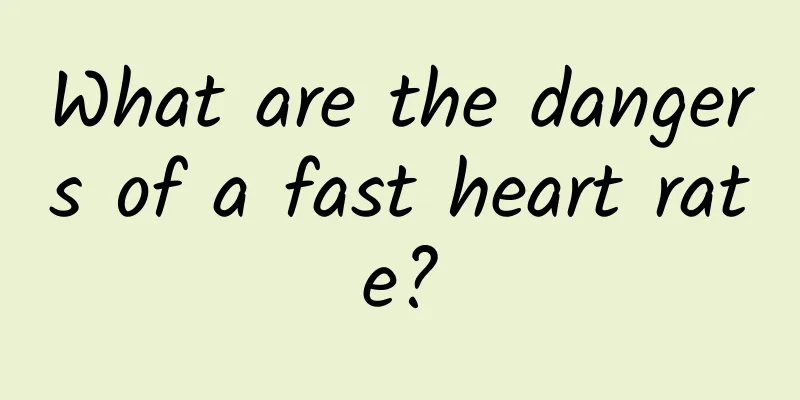What are the dangers of a fast heart rate?

|
We all know that people's heart rate will become very fast after being frightened or doing strenuous exercise, but some people with special physical conditions will have their heart rate speed up and their faces turn red after a little exercise. So many people think that this is a normal physiological reaction, but from a scientific point of view, the speed of the heart rate and whether it is normal or not are related to the length of life. If a fast heart rate is often a dangerous sign, then what are the dangers of a fast heart rate? Atherosclerosis may be caused by a fast heart rate A fast heart rate is harmful to health and shortens life, mainly by increasing the incidence and mortality of cardiovascular diseases. Because heart rate is a window that reflects the excitability of the sympathetic nerves, and enhanced sympathetic nerve excitation is one of the important mechanisms for the occurrence and development of many cardiovascular diseases, including hypertension. Especially for patients with hypertension, if their heart rate often increases, the blood flow in the blood vessels will be accelerated, the pressure will increase, causing damage to the vascular endothelium. Lipid deposition may occur at the damaged site, forming atherosclerotic plaques (i.e. atherosclerosis). Because the heart rate increases and the heart's contractility strengthens, it is easy to cause left ventricular hypertrophy, and the sudden death rate in hypertensive patients with left ventricular hypertrophy increases significantly. Therefore, experts recommend that the heart rate of patients with hypertension should not exceed 80 beats/minute, and for patients with angina pectoris, the morning heart rate should be controlled at 55-60 beats/minute. Atrial fibrillation increases stroke risk 3-5 times In addition to a fast heart rate, atrial fibrillation (AF) is also an abnormal heartbeat that is related to hypertension and can cause serious harm. The risk of stroke in patients with AF is 3 to 5 times that of those without AF. If a person's heartbeat is sometimes fast, sometimes slow, or sometimes stops and starts, it is called "arrhythmia". Atrial fibrillation is the most common type of arrhythmia. Chen Luyuan introduced that the symptoms of atrial fibrillation are absolutely irregular heartbeat, often accompanied by rapid heartbeat. A regular heartbeat is controlled by the sinoatrial node of the heart, but when atrial fibrillation occurs, the atrial muscle takes over the beating, making it irregular and the heart pumps blood poorly. Due to slow blood flow and blood stagnation, blood easily coagulates into blood clots that stick to the atrial wall, fall off, and block blood vessels, causing a heart attack or stroke. The occurrence of atrial fibrillation is related to age and organ function. The incidence of atrial fibrillation in adults without heart disease is generally 0.5%, which increases to 2%~4% at the age of 60, 4%~8% at the age of 60~79, and 8%~10% at the age of 80 and above. It is particularly noteworthy that hypertension and atrial fibrillation often occur together. Among 100 cases of atrial fibrillation, 9 to 22 have hypertension; among 100 cases of hypertension, 4 to 6 have atrial fibrillation, and the rest have both conditions, making it impossible to distinguish the order in which they occur. Under conditions of high blood pressure, the peripheral resistance of human blood vessels increases, and the heart needs to increase its force to pump blood and contract forcefully, which over time causes myocardial hypertrophy and an enlarged heart. When the atria are enlarged, atrial muscle contraction is more likely to occur, resulting in atrial fibrillation. There is a total number of heartbeats. A fast heartbeat will shorten your life. Heartbeat is the common name for the medical term "heart rate". In nature, there is a very interesting rule that animals with a fast heart rate have a short lifespan: mice have a heart rate of 300 to 500 beats per minute and only live 1 to 2 years; turtles have a heart rate of only 6 to 10 beats per minute and can normally live for hundreds or even thousands of years. In fact, except for special hibernating animals such as elephants, giraffes, pandas, etc., the heart rate of most animals is faster than that of humans. Humans have a relatively slow heart rate in nature and also have a longer lifespan. Why do animals with slow heartbeats live longer? The heart is not a perpetual motion machine. There is a limit to the total number of times it beats. For example, in humans, generally speaking, more than 95% of normal adults have a heart rate of 60 to 100 beats per minute, but most of them only have a heart rate of 70 to 80 beats per minute. In a lifetime, the heart will beat approximately 2.5 billion to 3 billion times. A heart rate that is too fast means that the total number of heart beats is quickly consumed, which naturally shortens life. Under normal circumstances, a healthy person's heartbeat is constant. It slows down to 50-60 beats per minute when sleeping and speeds up when eating or exercising. Chen Luyuan introduced that after an average person runs 400 meters, their heartbeat speeds up to 80-120 beats per minute, and they feel breathless and their heart beats wildly. When suddenly facing a tiger, a poisonous snake or other tense or exciting situation, their heart beats so fast that it is about to jump out of their throat and they cannot count their pulses. This is normal. If your heart rate exceeds 100 beats per minute when you walk briskly, that is abnormal. Athletes or people who are particularly healthy will have a strong heart rate and pulse. When they are at rest, their heart rate is only 50 to 60 beats per minute. After a sprinter runs 400 meters, their heart rate may only increase to 100 beats per minute. "The lower the heart rate, the better. Sinus bradycardia can be fatal." Experts say that if the heart rate and pulse are less than 50 times, most of them are pathological and require treatment. In severe cases, a pacemaker should be installed to speed up the heart rate. The principle is that the heartbeat is too slow and the atria are not supplied with enough blood, which leads to hypoxia and ischemia in the human body. The compensatory ventricles speed up their movement to supply blood. However, the ventricles move too fast, which in turn causes a lack of blood return, resulting in sudden death. In severe cases, the person may die in his sleep. People whose heart rate cannot return to 70-80 beats per minute after exercise or daily activities should pay special attention. Expert advice: Heart rate control drugs + moderate exercise two-pronged approach If you want to control your heart rate, you should first pay attention to reducing work pressure and mental stress, lose weight, exercise more, eat a low-salt diet, quit smoking, avoid alcohol, etc. At the same time, you also need to choose appropriate heart rate control drugs. Beta-blockers, represented by metoprolol succinate sustained-release tablets (ZOK), are recognized as one of the cornerstones of the treatment of cardiovascular diseases. They can effectively control heart rate by inhibiting excessive activation of sympathetic nerves, and their inventor won the Nobel Prize in Medicine for this. It should be noted that patients with high blood pressure, high blood lipids, and high blood sugar must pay attention to moderate exercise. Generally, it is normal for the heart rate to reach 100-120 beats/minute after exercise. If it exceeds or approaches 140 beats/minute, or even cannot recover to a heart rate of less than 100 beats/minute 5 minutes after the end of exercise, it is sinus tachykinesis, which is very dangerous. |
<<: What are the methods for repairing fall scars?
>>: What can you eat to strengthen your spleen and stomach and eliminate dampness?
Recommend
Chinese medicine for cold cough
The cause of cold cough is closely related to the...
The weight loss effect of lotus leaf, hawthorn, tangerine peel and coix seed tea and its preparation method
Among various methods of losing weight, slimming ...
Ma Huang Fu Zi Xi Xin Tang for Insomnia
Many people have heard of Ma Huang Fu Zi Xixin De...
What to do if the left solar plexus is swollen and painful
The temples are on both sides above the eyes. If ...
What is the best thing to drink with angelica
Chuanxiong is a Chinese herbal medicine that is n...
What causes itchy corners of eyes due to rhinitis?
Most patients with rhinitis should feel uncomfort...
Femoral head bursitis
Femoral head bursitis is a very common disease in...
There is a small eye when the cyst breaks
Some friends who have cysts do not understand muc...
What Chinese medicine to use for skin allergies
Many people will experience itchy skin in spring....
What are the effects and edible methods of placenta
It is known that few people know about placenta, ...
Wine soaking recipe
The recipe for medicinal materials for wine soaki...
What to do with peritoneal edema
The human body has a certain amount of fluid capa...
How to treat blisters caused by burns
Blisters on burns are a common symptom. It mainly...
Black mole is a bit painful
Most people will have moles on their bodies or fa...
How often should the ring be replaced?
The contraceptive ring is a contraceptive device ...









